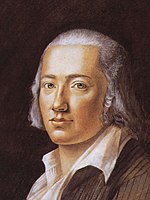Friedrich Hölderlin, Date of Birth, Place of Birth, Date of Death
TweetFriedrich Hölderlin
German poetAbout Friedrich Hölderlin
- Johann Christian Friedrich Hölderlin (UK: , US: ; German: ['jo?han 'k??sti?a?n 'f?i?d??ç 'hœld?li?n]; 20 March 1770 – 7 June 1843) was a German poet and philosopher.
- Described by Norbert von Hellingrath as "the most German of Germans", Hölderlin was a key figure of German Romanticism.
- Particularly due to his early association with and philosophical influence on Georg Wilhelm Friedrich Hegel and Friedrich Wilhelm Joseph Schelling, he was also an important thinker in the development of German Idealism.Born in Lauffen am Neckar, Hölderlin's childhood was marked by bereavement.
- His mother intended for him to enter the Lutheran ministry, and he attended the Tübinger Stift, where he was friends with Hegel and Schelling.
- He graduated in 1793 but could not devote himself to the Christian faith, instead becoming a tutor.
- Two years later, he briefly attended the University of Jena, where he interacted with Johann Gottlieb Fichte and Novalis, before resuming his career as a tutor.
- He struggled to establish himself as a poet, and was plagued by mental illness.
- He was sent to a clinic in 1806 but deemed incurable and instead given lodging by a carpenter, Ernst Zimmer.
- He spent the final 36 years of his life in Zimmer's residence, and died in 1843 at the age of 73. Hölderlin followed the tradition of Johann Wolfgang von Goethe and Friedrich Schiller as an admirer of Greek mythology and Ancient Greek poets such as Pindar and Sophocles, and melded Christian and Hellenic themes in his works.
- Martin Heidegger, whom Hölderlin had a great influence on, said: "Hölderlin is one of our greatest, that is, most impending thinkers because he is our greatest poet."
Read more at Wikipedia
See Also
- Famous People's Birthdays on 20 March, Germany
- Famous People's Birthdays in March, Germany
- Famous writer's Birthdays on 20 March, Germany
- Famous writer's Birthdays in March, Germany
- Famous poet's Birthdays on 20 March, Germany
- Famous poet's Birthdays in March, Germany
- Famous librarian's Birthdays on 20 March, Germany
- Famous librarian's Birthdays in March, Germany
- Famous translator's Birthdays on 20 March, Germany
- Famous translator's Birthdays in March, Germany
- Famous philosopher's Birthdays on 20 March, Germany
- Famous philosopher's Birthdays in March, Germany
- Famous novelist's Birthdays on 20 March, Germany
- Famous novelist's Birthdays in March, Germany


 Date of Birth:
Date of Birth:  Place of Birth: Lauffen am Neckar, Baden-Württemberg, Germany
Place of Birth: Lauffen am Neckar, Baden-Württemberg, Germany